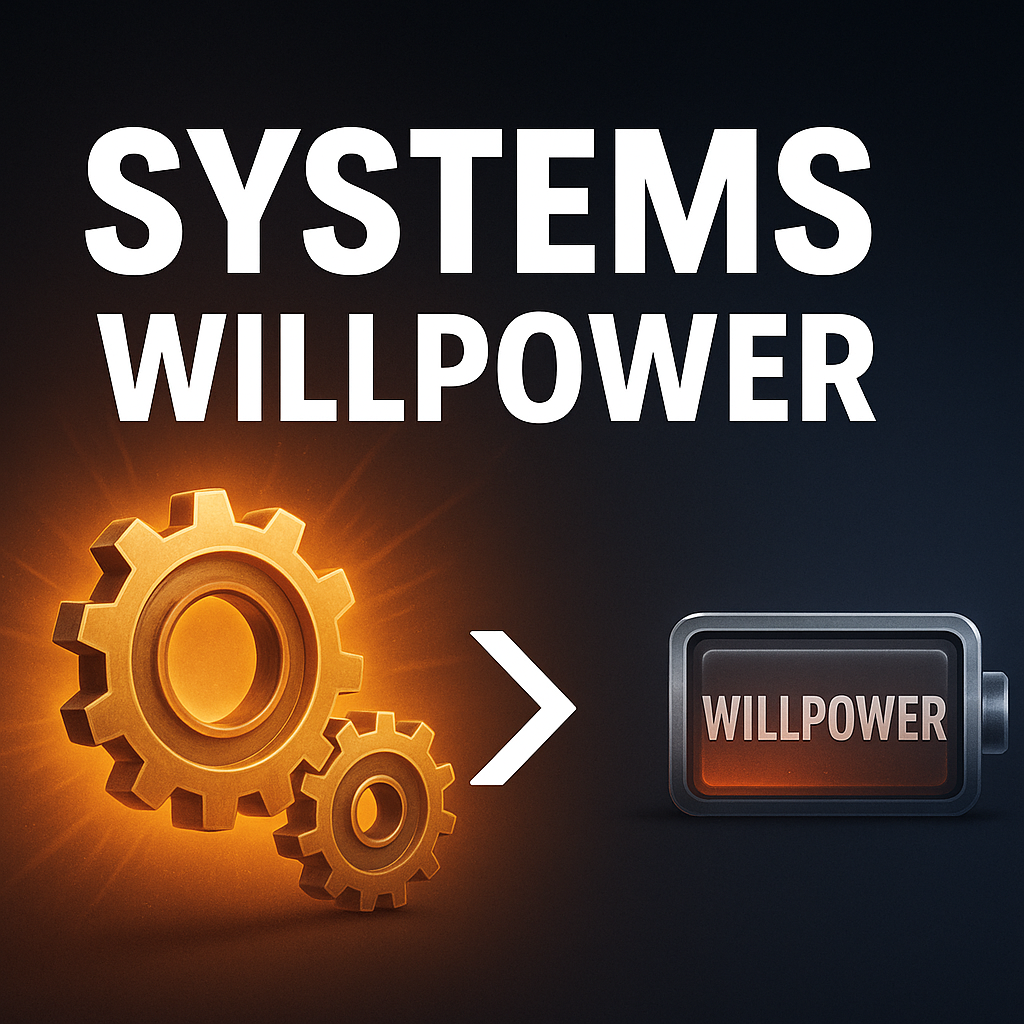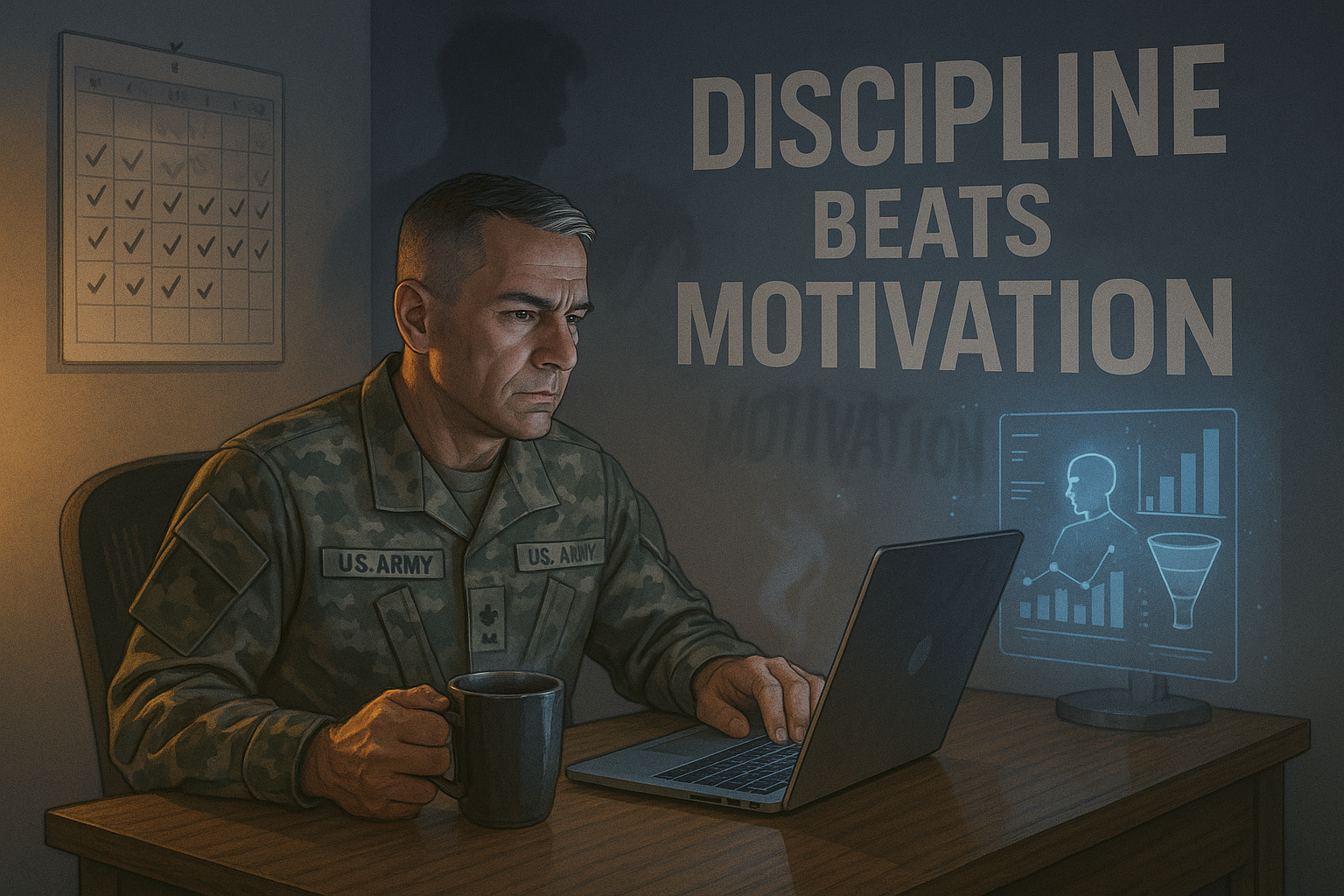Let’s get one thing straight: my sock drawer tells the truth about me. I’m motivated for about three January days before chaos wins. Sound familiar? Years ago, I launched my first online venture with a Red Bull in hand and a 'this will change everything' attitude. Motivation got me to Day 4. Systems got me to Day 400. In this post, I’ll show you why your business needs routines and systems (not just pep talks) to survive the long haul. And yes, I’ll sprinkle in some lessons learned the hard way—plus a few stories so human you’ll be amazed I kept my business pants on.
Willpower: The Spark That Always Burns Out (and What to Do About It)
Let’s be honest: willpower is a powerful spark. It’s what gets us out of bed on January 1st, lacing up our sneakers or launching a new business idea with a burst of excitement. I’ve felt that rush myself—like the time I promised to write a daily blog post, convinced that my motivation would carry me through. (Spoiler: my readers are still waiting for day three.)
This isn’t just my story. We’ve all seen gyms packed in January and empty by February, or watched friends (and ourselves) abandon ambitious diets after a stressful week. The truth is, willpower is key for getting started, but it rarely sustains ongoing effort. In the world of business, this lesson is even more critical.
Willpower vs Systems: Why Motivation Fades
Research shows that willpower is a limited resource. According to The Happiness Index, willpower can be drained by stress, temptation, or even something as simple as a late-night cookie. When you’re running a business, every decision—big or small—chips away at your mental energy. This is called decision making fatigue, and it’s a silent productivity killer.
Studies published in the National Library of Medicine confirm that as entrepreneurs face more choices, their error rates go up and productivity drops. Willpower limitations effort, especially when you’re juggling a dozen tasks and unexpected problems each day.
The Trap of Effort-Based Willpower
It’s easy to believe that if we just try harder, we’ll get better results. But effort-based willpower is not reliable for long-term business growth. I learned this the hard way. When I tried to write blog posts only “when I felt like it,” my output was unpredictable. Some weeks I’d publish daily, other weeks—nothing. My audience couldn’t count on me, and neither could I.
'You don’t rise to the level of your goals. You fall to the level of your systems.' – James Clear
Why Systems Outlast Willpower
Here’s the shift: systems don’t quit. A good system removes decision fatigue and gives you structure. Think about brushing your teeth. You don’t do it because you’re motivated every night—you do it because it’s a habit, built into your routine. That’s the power of a system in business, too.
- Systems automate decisions, so you don’t waste willpower on routine tasks.
- Systems create consistency, so your business moves forward even on your worst days.
- Systems support productivity by reducing the mental load of daily choices.
Willpower may start the journey, but it rarely finishes it. If you want to outlast the ups and downs of entrepreneurship, you need more than motivation—you need a system that works even when you don’t feel “on.”
Routine as Your Business Superpower: How Systems Do the Heavy Lifting
When I first started my online business, I thought success was all about working harder and pushing myself with sheer willpower. But after a few months, I hit a wall. My motivation dipped, and suddenly, every small task felt like a mountain. That’s when I discovered the real benefits of business systems—and everything changed.
How Routines Reduce Mental Effort
Every day, we make thousands of tiny decisions. What to work on first? How to respond to emails? Over time, this constant decision-making drains our energy—a phenomenon known as decision fatigue. But routines and systems act as a solution, quietly doing the heavy lifting. When you have a set schedule or a templated workflow, you don’t have to think about what comes next. You just do it.
For example, I haven’t skipped my morning coffee once in years. Not because I’m always excited for it, but because it’s a ritual—a habit so ingrained, it happens without thought. That’s the secret behind habit formation in business: when routines become automatic, you save your willpower for the big stuff, like creative problem-solving or growth strategies.
Turning Chaos Into Clockwork: Examples of Business Routines
- Scheduling: Blocking time for deep work, meetings, and admin tasks ensures nothing falls through the cracks.
- Templated Workflows: Using checklists or templates for onboarding clients or launching products means you never start from scratch.
- Automated Emails: Setting up sequences for follow-ups, newsletters, or customer support keeps your communication consistent—even on your busiest days.
Each of these routines takes the guesswork out of daily operations. Over time, they turn business chaos into reliable clockwork, freeing up your mental bandwidth for innovation and growth.
Automation: The Invisible Superpower
Automation in online business is like having an extra set of hands. Tools like the A.I. Freedom Launchpad offer step-by-step business structure, templates, and automation that keep your business moving forward—even when your motivation is nowhere to be found. I’ve seen firsthand how automated systems can keep leads coming in, emails going out, and projects progressing, all while I focus on high-value tasks.
Good systems make the right thing easy to do, even on the worst day. – Charles Duhigg
Research backs this up: systems help prevent decision fatigue, leading to higher productivity and more consistent results (source). When you build effective business routines, you’re not just making life easier—you’re setting yourself up for sustainable success. Over time, these routines become invisible superpowers, quietly working in the background so you can focus on what matters most.
Automation & Templates: Setting Your Business on ‘Cruise Control’
There’s a moment every online entrepreneur faces: the day you realize willpower alone won’t keep your business afloat. I hit that wall hard. My to-do list was endless, my energy was fading, and I was spending more time on repetitive admin than on the creative work I loved. That’s when I discovered the power of automation in online business and the magic of templates. Suddenly, I wasn’t just surviving—I was thriving.
Why Automation Tools in Business Are a Game Changer
Let’s be real: no one starts a business to spend hours sending invoices or chasing down client forms. Automation tools in business are like having a silent partner who never gets tired or distracted. They handle the repetitive stuff—scheduling, reminders, follow-ups—so you can focus on what really matters (like, you know, having a life).
Industry case studies show that automated systems reduce operational errors by up to 70%. That’s not just a stat—it’s a lifeline for entrepreneurs who want to optimize willpower with systems and avoid burnout. As Tim Ferriss puts it:
“Automation doesn’t replace you—it replaces what drains you.”
Templates: The Unsung Heroes of Business Structure
Some people think templates are boring or restrictive. I used to be one of them—until I realized that business structure templates are what keep the wheels turning, even when my motivation tanks. Templates create predictable, repeatable results. They ensure nothing falls through the cracks, especially on those days when my energy is low or distractions are high.
- Email sequences: No more rewriting the same welcome message.
- Client onboarding checklists: Every step, every time—no missed details.
- Content calendars: Consistency without the mental gymnastics.
With templates, I found that my creativity actually flourished. Instead of wasting willpower on routine decisions, I could pour my energy into the parts of my business that needed it most.
Real Talk: How Automation Gave Me My Weekends Back
Here’s a quick story. The day I automated my client onboarding process was the day I got my weekends back. Before automation, every new client meant a flurry of emails, reminders, and manual data entry. Now, with a few clicks, my system handles it all—welcome emails, contracts, even calendar invites. I can step away from my desk knowing my business is still moving forward.
Entrepreneurs who embrace business automation features report higher satisfaction and more time for strategic thinking. The A.I. Freedom Launchpad takes this even further with plug-and-play automation that minimizes overwhelm and keeps your business on cruise control—no matter how you’re feeling that day.
Automation and templates aren’t just about efficiency—they’re about sustainability. They battle burnout, reduce mistakes, and ensure your business keeps growing, even when your willpower is running on empty.
Conclusion: Build a System, Not Just a Back-Up Plan (Plus a Weird Analogy)
When I first started my journey in entrepreneurship, I thought willpower was everything. I believed that if I just tried harder, pushed myself more, and stayed “motivated,” I could outwork any challenge. But here’s the truth I learned the hard way: motivation is fickle, and willpower runs out—usually right when you need it most. That’s why so many diets, gym memberships, and yes, even new businesses, fizzle out before they ever see real results.
So, what’s the secret to long-term business growth systems and entrepreneurship success strategies? It’s not about having a back-up plan for when you lose steam. It’s about building a system that keeps your business moving forward, even when you’d rather binge-watch TV than check your emails. Systems for lasting change are the real game-changer. They don’t just catch you when you fall—they make it almost impossible to fall in the first place.
Let me give you a weird analogy: If willpower is a leaky rowboat, a system is your entire fleet. With willpower, you’re constantly bailing out water, hoping you’ll make it to shore. But with a system, you’ve got a reliable ship, a backup engine, and even a crew to help you navigate choppy waters. Your business isn’t just surviving; it’s built to weather any storm. That’s what I mean when I say systems aren’t just back-up plans—they’re the foundation of a reliable, anti-fragile business.
Think about brushing your teeth. You don’t do it because you’re wildly motivated every morning; you do it because it’s a habit, a system you’ve built into your life. The same logic applies to business. When you create routines, use templates, and automate tasks, you remove the need for daily decision-making. You reduce friction. You make progress automatic. As Marie Forleo says,
“The best businesses don’t work harder; they work smarter—by systemizing success.”
Here’s my final take: Set your business up so it runs even when you’re not at your best. Experiment with templates, routines, and automation. Don’t wait for motivation to strike—let your systems do the heavy lifting. Maintain business motivation by making it almost unnecessary; let your systems carry you through the days when you’re tired, distracted, or just not feeling it.
Willpower fades, but a good system is like auto-pilot for your goals. Invest in systems, and watch your business keep moving—whether or not you’re feeling it that day. That’s the real secret behind lasting change and sustainable success. Build your fleet, not just a leaky rowboat, and you’ll be ready for whatever the entrepreneurial seas throw your way.
TL;DR: Willpower fizzles, but systems persist. If you want consistent results in your online business, focus on building practical routines and automation instead of relying on fleeting motivation. Systems win every time.



